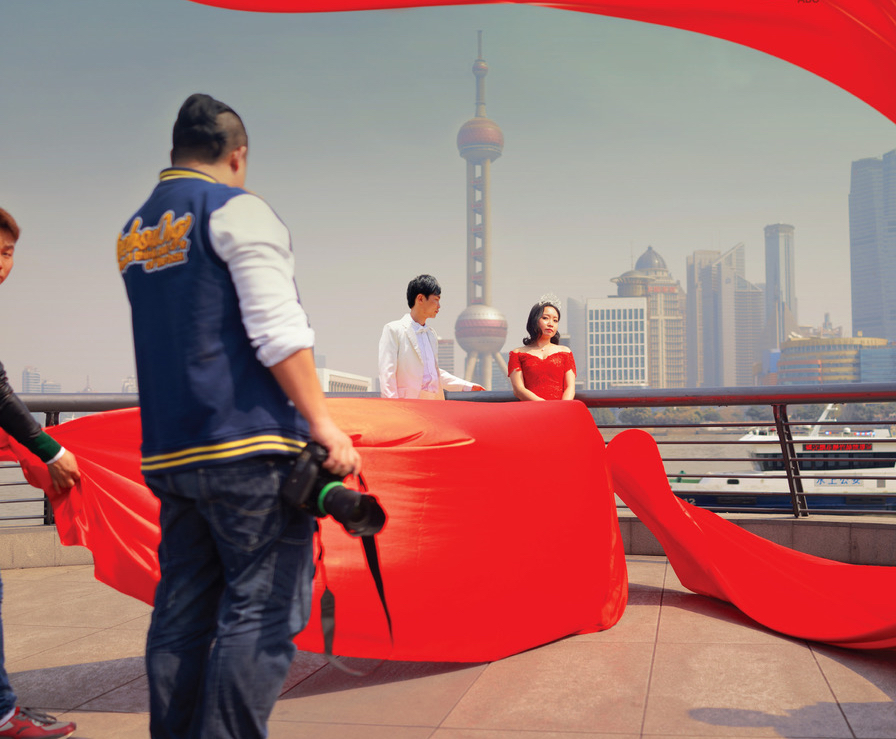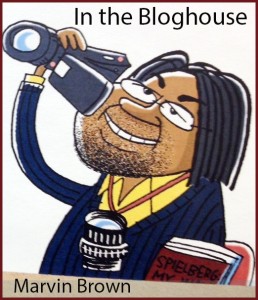Cleveland International Film Festival
China Love (2018)
Unrated

Media Stockade
China Love begins by fastidiously documenting the phenomenon of elaborate pre-wedding photography in modern-day China. We’re introduced to dozens of brides-to-be shot in unbelievable gowns surrounded in unbelievable settings. We witness elaborate underwater setups, shots where couples are made to seem like they are floating in air, and every kind of fantasy made real. The film immediately springs to life, aided by bouncing editing, upbeat tempos—I thought of the kinetic energy of box-office smash Crazy Rich Asians.
 Soon, through and around its steady stream of beaming brides and dapper grooms, a richer film flows. The contemporary flash is contrasted with 40 years earlier, when marriages were arranged and nondescript. Elderly couples reflect on a time when it was unthinkable to allow such grandiose celebrations of marriage. They don’t speak with outrage, mind you, but of sadness or regret that their weddings lack such … romance? Fantasy?
Soon, through and around its steady stream of beaming brides and dapper grooms, a richer film flows. The contemporary flash is contrasted with 40 years earlier, when marriages were arranged and nondescript. Elderly couples reflect on a time when it was unthinkable to allow such grandiose celebrations of marriage. They don’t speak with outrage, mind you, but of sadness or regret that their weddings lack such … romance? Fantasy?
Directed by Olivia Martin-McGuire, herself a professional photographer, China Love suggests a better understanding of Chinese culture might be gleaned through this look into how fantasies are served through the ritual of elaborate pre-wedding photos. In addition to elder couples reminiscing on a bygone era, Martin-McGuire documents young Shanghai and Beijing couples caught up in the pre-wedding-photo frenzy. Some do it to walk lockstep with this contemporary trend, others because of pressure to honor tradition.
In the documentary we meet Allen Shi, the young entrepreneur who has ridden this industry into the Billionaire Boys Club. It’s an industry that flourishes in China to the tune of $80 billion. Allen has a stable of photographers, clothing makers, makeup artists and set designers who churn out movie-quality pre-wedding photo fantasies. Allen, with his American personal assistant Eric in tow, speaks the usual billionaire bromides of how anyone can have his level of success if they work as hard as he works. Allen, though, is more than an outsized stereotype. He’s come from stark poverty, and despite his humble beginnings, has amassed 7,000 employees and more than 300 studios across seven countries. Eric nods approvingly. Eric had originally planned on living in China for a year. His connection with Allen put him on a five-year trajectory that shows no signs of slowing down. Is it ironic that Eric chases his American Dream by peddling American fantasies in China?
Later, we learn of Allen’s disturbing and exacting standards when he fines employees for the slightest deviations from his formula of “perfect” pre-wedding photos. If a hair is out of place, if skin tone is not just right, if lighting is off, there are financial consequences—up to dismissal. It’s startling to see the nitpicking when very similar photos are place side by side. Big business means tough standards, I guess. But it’s more than financial success; Allen’s reputation is at stake.
We also meet Kim, one of Allen’s senior photographers. The often-giggling Kim is a skilled cameraman on autopilot. He knows his stuff, knows his clients and the market, and—along with the upscale capital provided by Allen’s deep pockets—delivers with precision.
The director’s experiences as a photographer and her apparent love of China inform the film with its astonishing look. Beautiful vistas abound. The Shanghai skyline with its regal, futuristic-looking skyscrapers; the bustling China streets, the corner stores and restaurants, clothesline between apartments, beachfront glory. As her film goes on, Martin-McGuire digs deeper into the material.
Eventually, we get a peek into “marriage markets,” where desperate “aging” women are paired up with potential spouses. In China, unmarried women run the risk of isolation. Men are advised not to become engage without at least owning an apartment. The pressures of matrimony are tremendous. In one sad interlude we see the divorced mother of featured bride Viona. The older woman, Han Pan, regards an elegant photograph of herself in a wedding dress. Han Pan had the photo taken after divorce, as single woman, wanting her keepsake of the fantasy. Late in the documentary, there is an echo of this moment as her now-married daughter Viona laments returning to China from her post-wedding life in Australia because of a lack of job opportunities for her husband. Viona seems to fear becoming her mother.
I can’t say enough about the photography of the film. Despite countless depictions of pre-wedding photos, the film’s look is forever beguiling and never seems redundant. The director (and her subjects) keep coming up with ways to dazzle us with costuming, set design and lighting.
Through it all there’s something more important emerging in the margins of the film. The older couples recall limited resources, and censured speech. The younger couples hardly seem to live in a time of restrictions. Things within their grasp couldn’t be consider before the Cultural Revolution. Yet, now, they can have their imagination’s and heart’s desires—provided they have the financial resources. It’s interesting that even though the older couples mostly admit they didn’t marry for romance and pageantry, the younger couples don’t really seem enveloped in romance either. There’s a sense of securing stature, of relieving pressures placed on them to marry—but no real efforts for the sake of romance.
A marvelous sequence late in the film involves elderly couples having an opportunity to take the pre-wedding photos they were never able to have. Seeing an 80-year-old woman don makeup, a crown and an off-the-shoulder dress is truly moving. The husbands too find themselves in the makeup chair and rendered dapper in nice suits! And in a moment, the importance of the pageantry of putting on elegant dresses and tuxedos transcends all the expensive glamor that has come before it.
China Love is an oddly compelling—and sometimes sad—look at the culture and commodity of marriage frozen in moments of unrelenting photographic beauty.

| Marvin Brown’s Movie Review Archive
Social tagging: China Love > Cultural Revolution > documentary > film review > In the Blrghouse > Marvin Brown > Olivia Martin-McGuire > wedding photos




